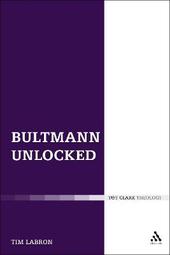
|
Bultmann Unlocked
Paperback / softback
Main Details
| Title |
Bultmann Unlocked
|
| Authors and Contributors |
By (author) Dr. Tim Labron
|
| Physical Properties |
| Format:Paperback / softback | | Pages:144 |
|
| Category/Genre | Protestantism and Protestant churches
Christian theology |
|---|
| ISBN/Barcode |
9780567616555
|
| Classifications | Dewey:230.41092 |
|---|
| Audience | | Professional & Vocational | |
|---|
|
Publishing Details |
| Publisher |
Bloomsbury Publishing PLC
|
| Imprint |
T.& T.Clark Ltd
|
| Publication Date |
6 September 2012 |
| Publication Country |
United Kingdom
|
Description
The unique character of Rudolf Bultmann's thought has been missed by many traditional studies that cast him in exegetical or hermeneutic frameworks. His methods of source criticism and his concept of 'demythologizing' have led some to reject his thought in toto, others to label him as a subjectivist. Tim Labron steps out of such traditional studies by reading Bultmann as a unique scholar and leading to the keys that unlock the distinct character of Bultmann's thought, namely, John 1,14 and the principle of justification by faith. Bultmann uses them in a parallel function - to burn the traditional subject-object hierarchies and self-made foundations to the ground. Labron shows the implications this had for theology, religious studies and philosophy.
Author Biography
Tim Labron is Associate Professor of Religious Studies at Concordia University College of Alberta, Canada.
ReviewsOnly a few years ago taking a degree in Christian origins or Protestant Christian theology would have included at least some acquaintance with Rudolf Bultmann. But Bultmann's writings, like Eliade's in the field of comparative religion, are now more often criticized or simply ignored. Dr. Labron, while not overlooking the problems with Bultmann's work, insists here on its perennial value for scholars in general and Christians in particular. He considers Bultmann's key point to be succinctly expressed in his exegesis of John 1:14a, underlining the divine as the counter-pole to the human, and the incarnation as a deep paradox. Labron emphasizes Bultmann's radical, independent thought, while also lingering on its deep points of similarity with Ludwig Wittgenstein. Bultmann's critique of objective historical research-stated more generally and in Christian terms: the human proclivity to justify oneself-encourages Labron to challenge some of the current assumptions in the academic study of religion by honouring the role of religious observers. Indeed, throughout this book Labron seeks to unlock the potential he sees in Bultmann to generate fresh thought and sound Christian theology. This book is a superb testimony to the creative energies of both these German and Canadian scholars. -- Michel Desjardins, Professor of Religion and Culture, Wilfrid Laurier University, Waterloo, Ontario, Canada. Labron notes that the work of Bultmann has fallen into obscurity. If his work is mentioned these days, its fate is a dismissive nod consigning it to the dustbins of the past. Labron rightly argues that this situation is unjustifiable, a consequence of a failure to grasp the import of Bultmann's work. That failure is rooted in misunderstanding, which Karl Barth noted, was common among Bultmann's contemporary critics. Nothing has changed. The aim of his book is to unlock Bultmann's thought from obscurity and the prison of dismissive misunderstanding. He does not seek to gain uncritical acceptance of Bultmann's thought, but to reveal what Bultmann called the actual scandal of the gospel. Using his own work on Wittgenstein and post-structuralism he sets out to show that Bultmann's existentialism is actually opposed to Cartesian thought, thus requiring reassessment. -- John Painter, Charles Sturt University, Australia Tim Labron has written a highly provocative book on Wittgenstein and Theology. He argues that Wittgenstein's philosophy moves away from the prevalent Western tradition of philosophy towards Jewish thought and finally Christian thought. Whereas Western philosophy and theology largely follow the Platonic and Cartesian paths, Wittgenstein doesn't, not does Chalcedon. This is only one of the many challenging points of this clearly written and well-argued study. It will no doubt provoke discussion about the relationship of Wittgenstein's philosophy to theology, and it should. -- Ingolf U. Dalferth * Claremont Graduate University, USA and University of Zurich, Switzerland. * Wittgenstein and Theology is a courageous statement in an age when few theologians are able or willing to undertake such original and broad examinations of traditional and contemporary questions. Labron has produced a work which will be of interest to both Wittgenstein specialists and to those who are more generally interested in the relationship between modern philosophy and theology in the Christian tradition. -- David Goodill OP, Blackfriars Hall, University of Oxford, UK.
|